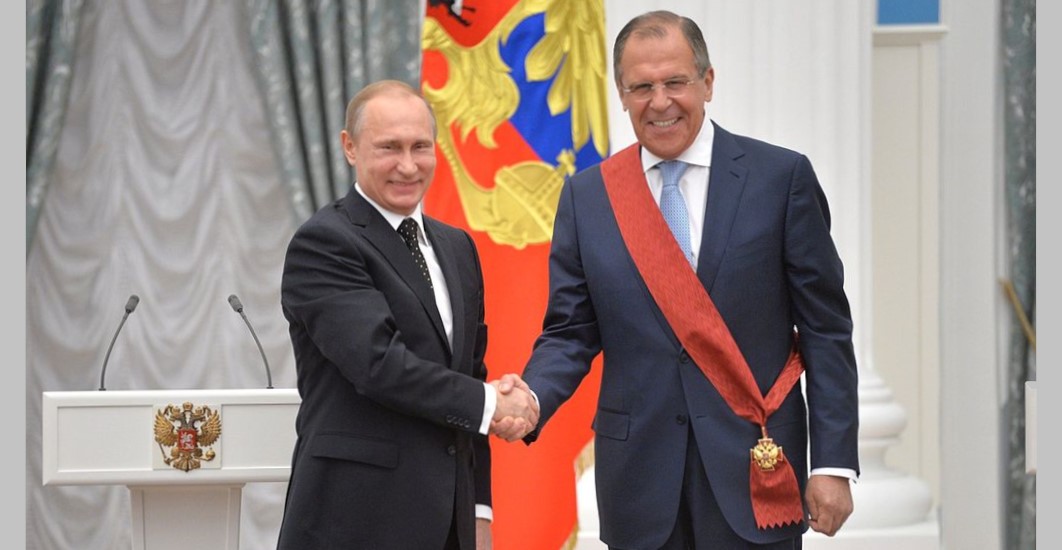In its December 27 Russian offensive campaign assessment, the Washington-based Institute for the Study of War (ISW) reported that Russian Foreign Minister Sergei Lavrov reiterated Russia’s plans to continue its war in Ukraine until the Ukrainian government capitulates to Russia’s demands. ISW notes that the Kremlin will likely continue its information operations that seek to “compel the West to offer preemptive concessions and pressure Ukraine to negotiate.”
Russian Foreign Minister Sergey Lavrov stated that the Kremlin will continue to pursue a military solution to the war until the Ukrainian government capitulates to Russia’s demands. Lavrov stated in a December 27 interview with Russian state news wire TASS that Ukraine and the West are “well aware of Russia’s proposals on the demilitarization and denazification” of Ukrainian-controlled territory and that the Russian military will settle these issues if Ukraine refuses to accept these proposals.
Russian demands for “demilitarization” aim to eliminate Ukraine’s ability to resist further Russian attacks, while the demands for “denazification” are tantamount to calls for regime change in Ukraine. Lavrov added that Ukraine and the United States must recognize Russia’s seizure of occupied Luhansk, Donetsk, Zaporizhzhia, and Kherson oblasts.
Putin did not say he is ready to negotiate with Ukraine, contrary to reporting – ISW
Lavrov stated that US-controlled Ukraine and the United States are responsible for prolonging the war as they could “put an end to [Ukraine’s] senseless resistance.” Lavrov’s invocation of a military settlement for the war in Ukraine that achieves Russia’s original war aims follows Russian President Vladimir Putin’s deliberately vague statements that Russia is open for negotiations on December 25. ISW assessed that Putin’s comments were not an offer to negotiate with Ukraine and indicated that he has not set serious conditions for negotiations.
Lavrov stated that Russia is unable to work on any agreements with the West due to its provocative actions in Ukraine and elsewhere. Lavrov stated that the United States and its NATO allies are pursuing “victory over Russia on the battlefield” in Ukraine “as a mechanism for significantly weakening or even destroying” the Russian Federation.
Lavrov nonsensically accused US military officials of planning a decapitation blow against the Kremlin that included killing Russian President Vladimir Putin. Lavrov also accused the United States and NATO members of being de facto parties to the war in Ukraine and of engaging in dangerous nuclear signaling.
Negotiations cannot end the Russian war against Ukraine, they can only pause it – ISW
Lavrov argued that Russian officials are unable to maintain normal communications or work on any proposals or agreements with the United States under these conditions, as the United States seeks to inflict strategic defeat against the Russian Federation. Lavrov stated that Russian officials are ready to discuss security issues in the context of Ukraine and in a broader, strategic plan, but only when American officials “realize the defectiveness of the current course” and return to “building mutually respectful relations on the basis of the obligatory consideration of legitimate Russian interests.”
The Kremlin will likely continue to focus its grievances against the West and ignore Ukraine as a sovereign entity in support of ongoing information operations that seek to compel the West to offer preemptive concessions and pressure Ukraine to negotiate. The Kremlin routinely portrays Ukraine as a Western pawn that lacks any actual sovereignty in order to disqualify Ukrainian officials from future direct negotiations and instead frame negotiations with Russia as being the responsibility of Western officials.[11] The Kremlin routinely highlights its grievances with the West over the war in Ukraine instead of its grievances with Ukraine itself to capitalize on the Western desire for negotiations and create a dynamic in which Western officials feel pressed to make preemptive concessions to lure Russia to the negotiating table.
The Kremlin will routinely depict Ukrainian officials as needlessly prolonging the war while reiterating its war aims in an attempt to influence Western officials to pressure Ukraine to negotiate on terms more favorable to Russia. ISW continues to assess that the Kremlin is not interested in serious negotiations that would produce a final settlement to the war in Ukraine, but instead seeks a temporary cessation of hostilities that would allow it to refit and replenish its military for further offensive campaigns against Ukraine.




